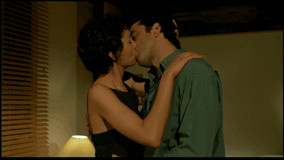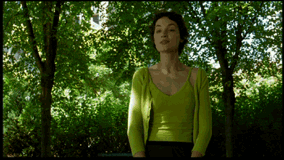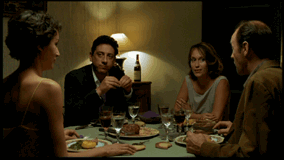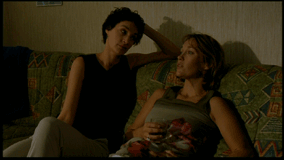Va Savoir (Who Knows?) (Jacques Rivette) 2001
 Va Savoir (Who Knows?) the newest film by Jacques Rivette, one of the
pioneers of the French New Wave, opened this year's New York Film Festival to
great effect. A delightfully small comedy that follows the lives of six people
in modern day Paris, this is the sort of film that is laden with subtleties of
character and action that might be missed if it were viewed amidst a quagmire of
several other films.
Va Savoir (Who Knows?) the newest film by Jacques Rivette, one of the
pioneers of the French New Wave, opened this year's New York Film Festival to
great effect. A delightfully small comedy that follows the lives of six people
in modern day Paris, this is the sort of film that is laden with subtleties of
character and action that might be missed if it were viewed amidst a quagmire of
several other films.
 The film begins on a stage as, Camille, an actress (Jeanne Balibar) talks to
an empty crowd about her anxieties. She feels afraid of the world, and lacks
will to go on. Soon, we find that the reason is her disenchantment with her
current lover/director, Ugo. We find that she has returned to Paris, her home,
for the first time in three years, and has left behind an ex named Pierre (who
is still humorously working on the same thesis three years later). Pierre is
currently married to Sonia, a dance instructor, that is being courted by Arthur,
the half-brother of Do, a student whom happens to be helping Ugo search for a
lost manuscript. There is a great deal of interplay in the film between
the characters before we discover their relationships to each other, and that is
the film's most tedious aspect. There is a willing suspension of disbelief
required to accept that these relationships all flow into each other the way
that they do, and the film takes its time in establishing them.
The film begins on a stage as, Camille, an actress (Jeanne Balibar) talks to
an empty crowd about her anxieties. She feels afraid of the world, and lacks
will to go on. Soon, we find that the reason is her disenchantment with her
current lover/director, Ugo. We find that she has returned to Paris, her home,
for the first time in three years, and has left behind an ex named Pierre (who
is still humorously working on the same thesis three years later). Pierre is
currently married to Sonia, a dance instructor, that is being courted by Arthur,
the half-brother of Do, a student whom happens to be helping Ugo search for a
lost manuscript. There is a great deal of interplay in the film between
the characters before we discover their relationships to each other, and that is
the film's most tedious aspect. There is a willing suspension of disbelief
required to accept that these relationships all flow into each other the way
that they do, and the film takes its time in establishing them.
 Once it does establish who is who, however, the film absolutely takes off.
The film is a comedy, but rarely relies on outright gags for laughs. The
majority of the humor lies in the shifting motivations of the characters. For
example, in one early scene, Camille, who feels embarrassed for the way her
partner Ugo acted during the previous night's dinner, goes to apologize to her
hostess, Sonia. Sonia, however, due to her own marital difficulties, naturally
assumes that Camille has come to apologize for the behavior of her
husband, Pierre. When Camille begins to apologize, Sonia starts making excuses
for Pierre's actions (which actually left Camille once again enamored with him).
Camille decides to alter her strategy here though, so she can better make a play
at Pierre. The subtleties of the contradictions in their actions are what we
derive our pleasure from. This might sound terribly convoluted, but on screen it
plays out simply and humorously.
Once it does establish who is who, however, the film absolutely takes off.
The film is a comedy, but rarely relies on outright gags for laughs. The
majority of the humor lies in the shifting motivations of the characters. For
example, in one early scene, Camille, who feels embarrassed for the way her
partner Ugo acted during the previous night's dinner, goes to apologize to her
hostess, Sonia. Sonia, however, due to her own marital difficulties, naturally
assumes that Camille has come to apologize for the behavior of her
husband, Pierre. When Camille begins to apologize, Sonia starts making excuses
for Pierre's actions (which actually left Camille once again enamored with him).
Camille decides to alter her strategy here though, so she can better make a play
at Pierre. The subtleties of the contradictions in their actions are what we
derive our pleasure from. This might sound terribly convoluted, but on screen it
plays out simply and humorously.
 As the characters continue to flip-flop the object of their affection, nearly
every scene takes on such lightly comic dimensions. Never do we feel that their
decisions don't make sense, though, as Rivette has composed a script that allows
us to always justify and understand each character's impetus. By essentially
limiting his cast to six members, he allows us, over the film's two and a half
hour running time, to grow to know each of them intimately. During the run of
the play, each of the characters comes to watch the play. We see a key scene
from the production as each of them is affected by it differently, and viewing
the play causes each to, once again, alter the way they see the other
characters. In Rivette's film, art doesn't imitate life, but rather inspires it.
The film's take on art, like its take on relationships, is more mature and
realistic than we see in most films. Much to my delight, in Va Savoir,
the characters actually think before they act, which is much rarer than one
would suspect in films.
As the characters continue to flip-flop the object of their affection, nearly
every scene takes on such lightly comic dimensions. Never do we feel that their
decisions don't make sense, though, as Rivette has composed a script that allows
us to always justify and understand each character's impetus. By essentially
limiting his cast to six members, he allows us, over the film's two and a half
hour running time, to grow to know each of them intimately. During the run of
the play, each of the characters comes to watch the play. We see a key scene
from the production as each of them is affected by it differently, and viewing
the play causes each to, once again, alter the way they see the other
characters. In Rivette's film, art doesn't imitate life, but rather inspires it.
The film's take on art, like its take on relationships, is more mature and
realistic than we see in most films. Much to my delight, in Va Savoir,
the characters actually think before they act, which is much rarer than one
would suspect in films.
* * * *
September, 2001
Jeremy Heilman